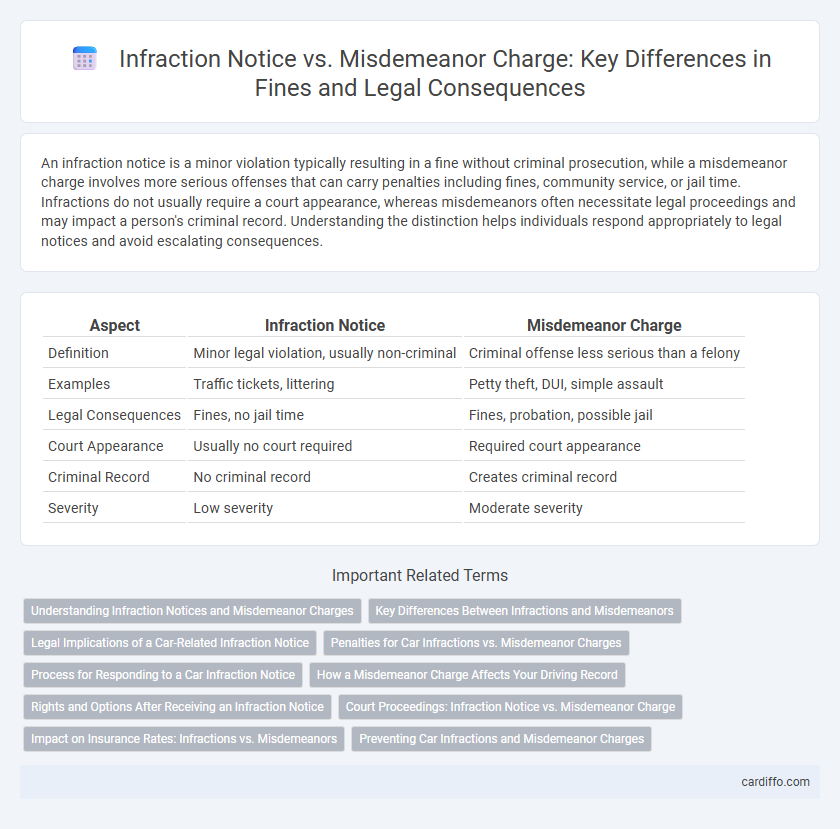An infraction notice is a minor violation typically resulting in a fine without criminal prosecution, while a misdemeanor charge involves more serious offenses that can carry penalties including fines, community service, or jail time. Infractions do not usually require a court appearance, whereas misdemeanors often necessitate legal proceedings and may impact a person's criminal record. Understanding the distinction helps individuals respond appropriately to legal notices and avoid escalating consequences.
Table of Comparison
| Aspect | Infraction Notice | Misdemeanor Charge |
|---|---|---|
| Definition | Minor legal violation, usually non-criminal | Criminal offense less serious than a felony |
| Examples | Traffic tickets, littering | Petty theft, DUI, simple assault |
| Legal Consequences | Fines, no jail time | Fines, probation, possible jail |
| Court Appearance | Usually no court required | Required court appearance |
| Criminal Record | No criminal record | Creates criminal record |
| Severity | Low severity | Moderate severity |
Understanding Infraction Notices and Misdemeanor Charges
Infraction notices are minor offenses typically punishable by fines without jail time, such as traffic violations or littering, and do not result in a criminal record. Misdemeanor charges are more serious, often involving potential jail time up to one year, and can include offenses like petty theft or simple assault, impacting a person's criminal record. Understanding the distinctions between infractions and misdemeanors helps in determining legal rights, potential penalties, and the necessary court procedures.
Key Differences Between Infractions and Misdemeanors
Infractions are minor legal violations usually punishable by fines without jail time, whereas misdemeanors are more serious offenses that can result in fines, community service, probation, or imprisonment. Infractions do not typically involve court appearances or a criminal record, but misdemeanors often require a court hearing and can lead to a permanent criminal record. The distinction impacts legal consequences, defense strategies, and long-term effects on an individual's background and rights.
Legal Implications of a Car-Related Infraction Notice
A car-related infraction notice typically involves minor traffic violations such as speeding or running a red light, resulting in fines but no criminal record. Unlike a misdemeanor charge, which may lead to court appearances, possible jail time, and a lasting criminal record, infractions are handled administratively without court trials. Understanding the legal implications helps drivers address penalties promptly and avoid escalating consequences.
Penalties for Car Infractions vs. Misdemeanor Charges
Penalties for car infractions typically involve fines and points on the driver's license, with minimal or no risk of jail time, reflecting their status as non-criminal offenses. Misdemeanor charges related to driving, such as reckless driving or DUI, can result in heavier fines, license suspension, mandatory community service, and potential imprisonment. The distinction in penalties underscores the severity of misdemeanors, which carry legal consequences that impact criminal records and future driving privileges.
Process for Responding to a Car Infraction Notice
Responding to a car infraction notice involves reviewing the citation details and determining due dates for payment or contesting the ticket. Many jurisdictions offer online portals for submitting a plea, requesting a hearing, or paying fines without appearing in court. Failure to respond promptly may escalate the infraction to a misdemeanor charge, resulting in increased penalties and potential court proceedings.
How a Misdemeanor Charge Affects Your Driving Record
A misdemeanor charge related to driving often results in points added to your driving record, potentially leading to increased insurance premiums and license suspension. Unlike an infraction notice, which is typically a minor violation with no impact on your criminal record, a misdemeanor is a criminal offense that can stay on your driving history for several years. This can affect future employment opportunities, especially for jobs requiring a clean driving record.
Rights and Options After Receiving an Infraction Notice
After receiving an infraction notice, individuals retain the right to contest the citation in traffic or municipal court, often without requiring legal representation. Options include paying the fine, attending traffic school to reduce penalty points, or requesting a court hearing to challenge the infraction, which does not typically result in a criminal record. Understanding these rights and the potential consequences enables recipients to make informed decisions that protect their driving privileges and legal standing.
Court Proceedings: Infraction Notice vs. Misdemeanor Charge
Infraction notices typically involve a streamlined court process, often resolved through payment of a fine without a formal trial, minimizing court appearances and legal complexities. Misdemeanor charges require a more detailed court proceeding, including arraignment, potential trial, and the possibility of legal defense representation. The distinctions in court proceedings directly impact the defendant's rights, potential penalties, and procedural requirements related to each offense type.
Impact on Insurance Rates: Infractions vs. Misdemeanors
Infractions generally have a minimal impact on insurance rates as they are considered minor violations and often do not appear on driving records reported to insurers. Misdemeanor charges, being more serious offenses, typically lead to higher insurance premiums due to increased perceived risk and potential for increased liability. Insurers assess misdemeanors as indicators of risky behavior, thereby significantly influencing premium adjustments compared to infractions.
Preventing Car Infractions and Misdemeanor Charges
Preventing car infractions and misdemeanor charges requires strict adherence to traffic laws and regular vehicle maintenance to avoid violations like speeding or running red lights. Utilizing defensive driving techniques and staying informed about local traffic regulations significantly reduces the risk of receiving an infraction notice or facing misdemeanor charges. Consistent compliance with road safety rules protects drivers from legal consequences and fosters safer driving environments.
Infraction notice vs Misdemeanor charge Infographic

 cardiffo.com
cardiffo.com